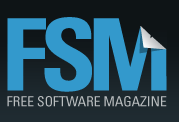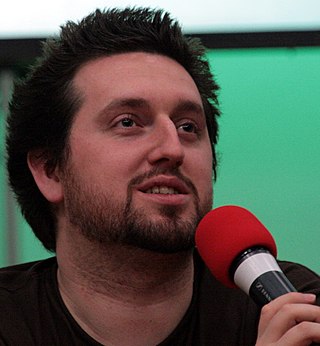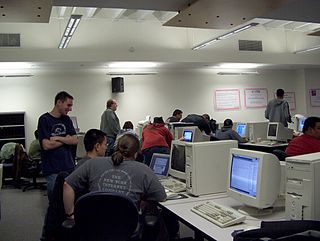Open Source Industry Australia (OSIA) is an Australian body created to "further the cause of both Free and Open Source Software (FOSS)". Founded in 2004 by Arjen Lentz, Con Zymaris and Brendan Scott, OSIA was formed after discussions between prominent members of the open source business community at linux.conf.au 2004 in Adelaide. Del Elson took on the role of the Secretary. [1]

Bruce Perens is an American computer programmer and advocate in the free software movement. He created The Open Source Definition and published the first formal announcement and manifesto of open source. He co-founded the Open Source Initiative (OSI) with Eric S. Raymond.

Free software, libre software, or libreware is computer software distributed under terms that allow users to run the software for any purpose as well as to study, change, and distribute it and any adapted versions. Free software is a matter of liberty, not price; all users are legally free to do what they want with their copies of a free software regardless of how much is paid to obtain the program. Computer programs are deemed "free" if they give end-users ultimate control over the software and, subsequently, over their devices.

GNU is an extensive collection of free software, which can be used as an operating system or can be used in parts with other operating systems. The use of the completed GNU tools led to the family of operating systems popularly known as Linux. Most of GNU is licensed under the GNU Project's own General Public License (GPL).

Linux Australia is the national, Australian Free and Open Source Software Community organisation. It was founded in 1997 and formally incorporated in New South Wales as a non-profit organisation in 1999. Linux Australia aims to represent Australian Free and Open Source Software communities and to support and collaborate with related groups, including Linux User Groups in Australia.
The Fedora Project is an independent project to co-ordinate the development of Fedora Linux, a Linux-based operating system, operating with the vision of "a world where everyone benefits from free and open source software built by inclusive, welcoming, and open-minded communities." The project's mission statement is to create "an innovative platform for hardware, clouds, and containers that enables software developers and community members to build tailored solutions for their users". The project also oversees Extra Packages for Enterprise Linux, a special interest group which maintains the eponymous packages. The project was founded in 2003 as a result of a merger between the Red Hat Linux (RHL) and Fedora Linux projects. It is sponsored by Red Hat primarily, but its employees make up only 35% of project contributors, and most of the over 2,000 contributors are unaffiliated members of the community.

The GNU/Linux naming controversy is a controversy regarding whether computer operating systems that use GNU software and the Linux kernel should be referred to as "GNU/Linux" or "Linux" systems.
LinuxChix is a women-oriented Linux community. It was formed to provide both technical and social support for women Linux users, although men are encouraged to contribute. Members of the community are referred to as "a Linux chick" (singular) and "LinuxChix" or "Linux Chix" (plural) regardless of gender.

Free Software Magazine is a Web site that produces a mostly free-content online magazine about free software.

Free and open-source software (FOSS) is software that is available under a license that grants the right to use, modify, and distribute the software, modified or not, to everyone free of charge. The public availability of the source code is, therefore, a necessary but not sufficient condition. FOSS is an inclusive umbrella term for free software and open-source software. FOSS is in contrast to proprietary software, where the software is under restrictive copyright or licensing and the source code is hidden from the users.
Alternative terms for free software, such as open source, FOSS, and FLOSS, have been a controversial issue among free and open-source software users from the late 1990s onwards. These terms share almost identical licence criteria and development practices.

Harald Welte, also known as LaForge, is a German programmer.

Jeff Waugh is an Australian free software and open source software engineer. He is known for his past prominence in the GNOME and Ubuntu projects and communities.

Linux is both an open-source Unix-like kernel and a generic name for a family of open-source Unix-like operating systems based on the Linux kernel, an operating system kernel first released on September 17, 1991, by Linus Torvalds. Linux is typically packaged as a Linux distribution (distro), which includes the kernel and supporting system software and libraries, many of which are provided by the GNU Project.

Pia Andrews, born 1979, is an open government leader and the Special Advisor, Digital & Client Data Workstream Lead for Employment and Social Development Canada (ESDC).
SUSE Linux is a computer operating system developed by SUSE. It is built on top of the free and open-source Linux kernel and is distributed with system and application software from other open source projects. SUSE Linux is of German origin, its name being an acronym of "Software und System-Entwicklung", and it was mainly developed in Europe. The first version appeared in early 1994, making SUSE one of the oldest existing commercial distributions. It is known for its YaST configuration tool.
Opposition to software patents is widespread in the free software community. In response, various mechanisms have been tried to defuse the perceived problem.

The GNU General Public License is a series of widely used free software licenses, or copyleft, that guarantee end users the four freedoms to run, study, share, and modify the software. The license was the first copyleft for general use and was originally written by Richard Stallman, the founder of the Free Software Foundation (FSF), for the GNU Project. The license grants the recipients of a computer program the rights of the Free Software Definition. The licenses in the GPL series are all copyleft licenses, which means that any derivative work must be distributed under the same or equivalent license terms. It is more restrictive than the Lesser General Public License and even further distinct from the more widely-used permissive software licenses such as BSD, MIT, and Apache.

A Linux User Group or Linux Users' Group (LUG) or GNU/Linux User Group (GLUG) is a private, generally non-profit or not-for-profit organization that provides support and/or education for Linux users, particularly for inexperienced users. The term commonly refers to local groups that meet in person but is also used to refer to online support groups that may have members spread over a very wide area and that do not organize, or are not dependent on, physical meetings. Many LUGs encompass FreeBSD and other free-software / open source Unix-based operating systems.